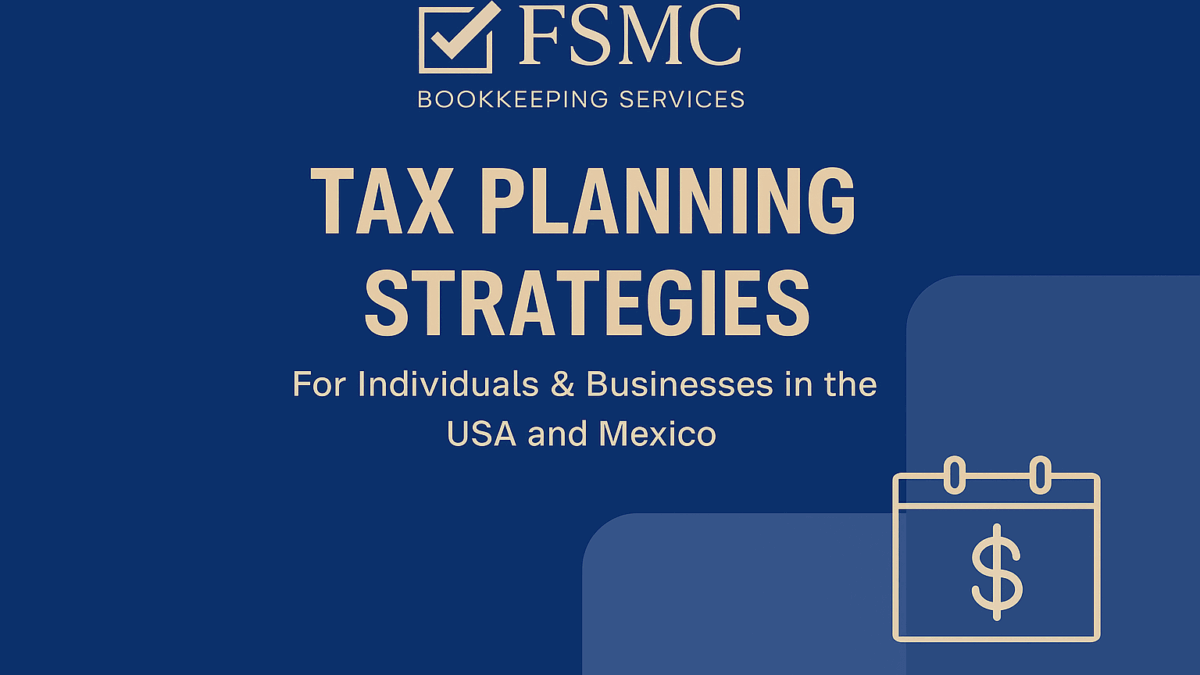
Why Small Business Owners Must Understand Financials
October 3, 2025Estate Taxes Explained: What You Need to Know
October 4, 2025
Key Tax Planning Strategies to Keep
By: FSMC Bookkeeping Services
View our Vlog on Cross Border Strategies here: :

The U.S. tax code doesn’t stand still—rules and thresholds shift constantly, and strategies that helped you save last year may end up costing you this year.
That’s why proactive, year-round tax planning is critical. At FSMC Bookkeeping Services, our CPAs specialize in guiding both businesses and individuals across the United States and Mexico through these changes to maximize savings and avoid surprises.
Below are some important areas to watch as you plan ahead:
1. Watch Out for Phaseouts
Many tax benefits—such as the Child Tax Credit, education-related deductions, or the additional senior deduction—don’t vanish immediately when your income rises. Instead, they phase out gradually. Even a small increase in income could reduce or eliminate valuable tax breaks.
Tip: Track your reported income closely. You may be able to remain within optimal ranges by contributing more to retirement accounts or adjusting the timing of income and expenses.
2. Standard vs. Itemized Deductions
While the standard deduction has risen significantly for 2025 ($31,500 for couples, $15,500 for singles), the recent increase of the State and Local Tax (SALT) deduction cap from $10,000 to $40,000 means many taxpayers may once again find itemizing worthwhile.
Tip: Don’t assume you’ll automatically take the standard deduction. Calculate both options. Consider grouping charitable contributions or property tax payments in the same year to maximize deductions.
3. Capital Gains and Timing
The difference between long-term and short-term capital gains can mean thousands of dollars in taxes. Holding an asset for at least one year and one day usually qualifies you for favorable long-term rates (0%, 15%, or 20%). Selling too soon, however, may subject you to higher ordinary income rates.
Tip: Plan your investment sales strategically. Use tax-loss harvesting near year-end to offset gains, and, if needed, spread asset sales across multiple years.
4. Qualified Business Income (QBI) Deduction
Business owners, self-employed professionals, and gig workers may qualify for a deduction of up to 20% on qualified business income. However, eligibility can change depending on how your income is structured and reported.
Tip: Evaluate your business setup and income reporting methods. Strategic use of retirement contributions, income deferrals, or expense timing could preserve your QBI deduction.
5. Retirement Accounts: Tax-Deferred vs. Tax-Free
Traditional IRAs and 401(k)s only postpone taxes—you’ll still owe when you withdraw. Roth accounts, however, allow you to pay taxes up front and enjoy tax-free distributions later. Choosing the right mix now depends on your expected future tax bracket.
Tip: Consider diversifying between traditional and Roth accounts. Partial Roth conversions during lower-income years can also provide long-term savings. Work with a tax professional to run long-term projections and optimize your approach.
The Bottom Line: Tax Planning is Year-Round
Tax planning shouldn’t be left to the filing deadline. By staying ahead of changes and making adjustments throughout the year, you can significantly reduce your liability and keep more of what you earn.
At FSMC Bookkeeping Services, our CPAs are here to help businesses and individuals in both the U.S. and Mexico make smarter tax decisions. Whether you’re navigating deductions, planning for retirement, or managing business income, we’ll provide the expertise you need.
📞 Schedule a FREE consultation today today to schedule a consultation and start building a tax strategy that works for you.
#TaxPlanning #CPAServices #Bookkeeping #TaxStrategy #BusinessFinance #SmallBusinessSupport #USATaxes #MexicoTaxes #FinancialPlanning #TaxSavings #FSMCBookkeeping




